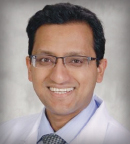Improved local-regional tumor control may not be enough to justify the increased morbidity of adding neoadjuvant radiation to chemotherapy in esophageal and gastroesophageal junction cancers, according to a pair of studies presented during the 2020 Society of Surgical Oncology (SSO) International Conference on Surgical Cancer Care.1,2
Findings of two separate studies showed an increased likelihood of pathologic complete response with chemoradiation vs chemotherapy alone in the neoadjuvant setting for both esophageal cancer and gastroesophageal junction adenocarcinoma. However, the addition of radiation to preoperative chemotherapy appeared to offer no long-term overall survival benefit. In the case of esophageal cancer, the meta-analysis also showed increased operative morbidity with neoadjuvant chemoradiation vs chemotherapy.

“Our analysis showed no increase in 5-year overall survival with chemoradiation [in esophageal cancer], despite higher R0 resection and complete pathologic response rates.”— Danny Yakoub, MD, PhD
Tweet this quote
“Neoadjuvant chemoradiation may improve local-regional control of esophageal cancer, but it’s associated with worse operative complications and does not improve long-term overall survival,” said Danny Yakoub, MD, PhD, Associate Professor of Surgery at the University of Tennessee Health Science Center, Memphis. “Using radiation in the neoadjuvant setting in addition to chemotherapy should be considered on a more selective basis.”
Background and Study Methods
Esophageal cancer is the ninth most common cancer and the fifth most common cause of cancer deaths in the United States, Dr. Yakoub reported, with a 5-year survival rate of up to 25% for resectable cases. Although multiple trials have shown the benefit of adding neoadjuvant treatment to surgery compared with surgery alone for T1b to T4a tumors, he noted, recent controversy has arisen about the optimal preoperative treatment regimen. European experts tend to favor preoperative chemotherapy, whereas North American experts seem to prefer preoperative chemoradiation.
For this meta-analysis, Dr. Yakoub and colleagues conducted a comprehensive online search of MEDLINE, EMBASE, PubMed, SCOPUS, and Cochrane databases for randomized controlled trials comparing neoadjuvant chemotherapy and chemoradiation in resectable esophageal cancer (January 2000 to October 2019). Outcomes of interest included R0 resection rates and complete pathologic response rates, rates of various postoperative complications, as well as disease-free and overall survival at 3 and 5 years.
Chemoradiation: More Complications, No Long-Term Survival Benefit
As Dr. Yakoub reported, after applying inclusion and exclusion criteria, six prospective and randomized controlled trials were included in the final analysis, with a total of 983 patients (495 received chemotherapy alone and 488 received chemoradiation). The demographic variables, comorbidities, tumor location, and stages were similar in both groups, and STROBE (Strengthening the Reporting of Observational Studies in Epidemiology) scores were all above 20, indicating good-quality studies.
Results of the meta-analysis showed that adding radiation to neoadjuvant chemotherapy was associated with an improved R0 resection rate, significantly higher rates of complete pathologic response, and increased disease-free and overall survival at 3 years vs chemotherapy alone.
However, chemoradiation was also associated with a significantly higher number of pulmonary and anastomotic complications. There were also more cardiac complications in the chemoradiation vs chemotherapy group, said Dr. Yakoub, although this did not reach statistical significance. Of note, there was no difference in 5-year survival between the chemotherapy and chemoradiation groups.
“Contrary to previous publications, our analysis showed no increase in 5-year overall survival with chemoradiation, despite higher R0 resection and complete pathologic response rates,” said Dr. Yakoub, who listed several potential causes. “It’s possible that radiation adds to preoperative deconditioning in many patients who never make it to surgery,” he suggested. “Although patients who make it to surgery have better survival data, at least in the short term, radiation increases operative morbidity, affecting survival.”
According to Dr. Yakoub, there also seems to be a correlation between chemosensitivity and radiosensitivity. “Complete pathologic response in the primary tumor suggests response in micrometastases, and this could therefore be attributed to chemotherapy rather than radiation,” Dr. Yakoub said.
Neoadjuvant Therapy for Gastroesophageal Junction Adenocarcinoma
A large, retrospective study of neoadjuvant therapy in resectable gastroesophageal junction and proximal gastric adenocarcinoma yielded similar findings. Patients receiving chemoradiation were significantly more likely to achieve pathologic complete response compared with chemotherapy alone, but there was no difference in overall survival. The study was led by Naruhiko Ikoma, MD, MS, of The University of Texas MD Anderson Cancer Center, Houston.
“The addition of radiation therapy to the preoperative regimen appears to be of no survival benefit,” said lead study author Syed Nabeel Zafar, MD, MPH, also of MD Anderson.

Naruhiko Ikoma, MD, MS

Syed Nabeel Zafar, MD, MPH
As Dr. Zafar reported, given its unique epidemiology, risk factors, and treatment strategies, gastroesophageal junction adenocarcinoma is increasingly being considered a unique entity. However, its management is still controversial, as randomized controlled trials have previously focused on either esophageal or stomach cancer.
“We know that a multimodal approach is beneficial, but it is unclear whether preoperative chemotherapy alone or chemoradiation would provide better long-term outcomes,” Dr. Zafar explained.
In lieu of a randomized control trial, Dr. Zafar and colleagues used the National Cancer Database to select patients from the esophageal and gastric data sets who underwent chemotherapy with or without chemoradiation followed by gastrectomy or esophagectomy between 2004 and 2015. Of the 13,783 patients included in the analysis, 12,129 (88%) received chemotherapy alone and 1,654 (12%) received chemoradiation. After propensity score matching, 1,650 patients were left in each group.
According to Dr. Zafar, multivariate analysis showed that patients who received chemoradiation were 2.7 times more likely to achieve pathologic complete response (defined as ypT0) compared with chemotherapy alone. However, the Cox regression model showed no difference in overall survival between chemoradiation and chemotherapy alone. The median follow-up was 2.37 years, and the 5-year overall survival was 37.8%.
Short-term outcomes showed higher rates of R0 resection in patients receiving chemoradiation. However, there was no difference in the length of stay, mortality, or readmission between the groups, Dr. Zafar reported.
DISCLOSURE: Drs. Yakoub and Zafar reported no conflicts of interest.
REFERENCES
1. Jalfon M, Minor G, Deschner B, et al: Neoadjuvant chemotherapy alone versus chemoradiotherapy for resectable esophageal cancer management: A meta-analysis of randomized controlled trials. 2020 SSO International Conference on Surgical Cancer Care. Abstract 135. Presented August 17, 2020.
2. Zafar SN, Blum M, Chiang YJ, et al: Preoperative chemoradiation versus chemotherapy in gastroesophageal junction. 2020 SSO International Conference on Surgical Cancer Care. Abstract 135. Presented August 17, 2020.


